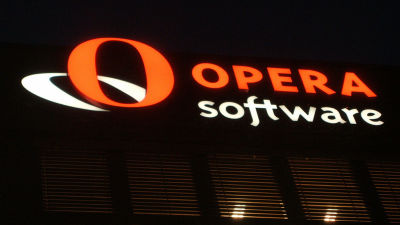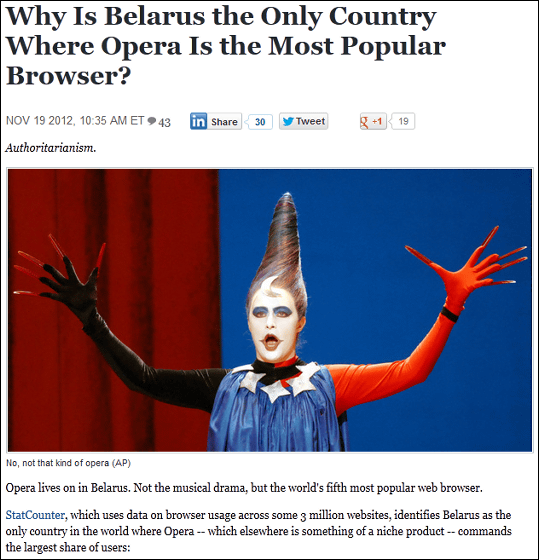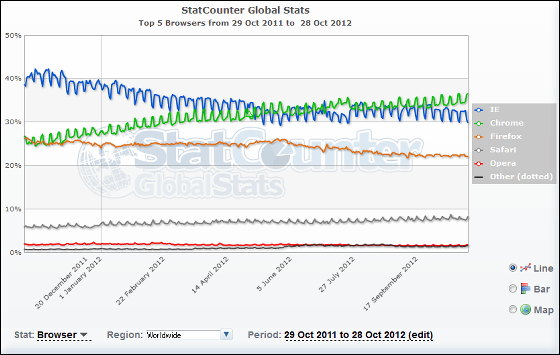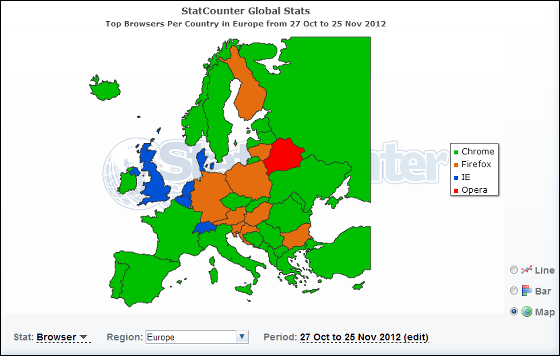Why Opera is the most popular browser in Belarus

ByAndyket
Currently contending for the most popular browser position in the world,According to the data of StatCounterWith Google Chrome and Internet Explorer, Firefox is a third place away, and Safari is further away,OperaIt is fifth place. However, looking at the country by country, Opera is the No.1 browser only in Belarus. Because I was born in Norway, "It is not a high share in my home country", but why on earth are Opera beloved in Belarus?
Why Is Belarus the Only Country Where Opera Is the Most Popular Browser? - Tim Fernholz - The Atlantic
http://www.theatlantic.com/technology/archive/2012/11/why-is-belarus-the-only-country-where-opera-is-the-most-popular-browser/265406/

StatCounter analyzes the share of browser from data of over 3 million sites, but it seems that there is a fact that Opera, which should be a "niche browser", is the No. 1 share in Belarus. This is the current total share, Opera is located below Safari.
StatCounter Global Stats - Browser, OS, Search Engine including Mobile Market Share
http://gs.statcounter.com/#browser-ww-daily-20111029-20121028

Looking at the country by country, Chrome is ranked number one among many countries, and only Belarus is Opera No. 1.
StatCounter Global Stats - Browser, OS, Search Engine including Mobile Market Share
http://gs.statcounter.com/#browser-eu-daily-20121027-20121125-map

Opera was born in Norway in 1996 as the second oldest browser in the world. Internet Explorer that Microsoft bundled (bundled) with Windows boasted an overwhelming share, but the function that the geeks want is not equipped, and Opera which is a competing horse has enthusiastic fans attached There was. However, in the fierce browser war, Opera 's business was in danger because IE introduced more and more popular features.
As IE integrates with Windows to increase market share and dominate computers, as a browser that confronts IE, Chrome enlarges the connection with various services of Google including Gmail and encloses users, Firefox builds in the community Having a huge number of add - ons that were done, I gained the support of open - source fans.
Meanwhile, Opera began fighting with "Ultimate" as a uri, and he decided to win a large share in Belarus. The reason is that BelarusiBeltelecomIt was a socialist state monopolized infrastructure by a state-owned enterprise named.
The Belarusian infrastructure condition under Beltelecom control was the worst, says Espen Andre Overdahl, Opera's community manager. However, under the worst circumstances, it seems that Opera gained support from Opera because it had a function to speed up display by optimizing HTML and images with its own proxy server. This also has the same view by Mr. Gleb Kanunnikau, a web developer living in Minsk, Belarus.
ADSL was introduced in Belarus between 2009 and 2010, and the monthly transfer volume regulation ceased, but until that time the Internet was speed limited. Also, as the cost was also very high, it seems that everyone used Opera to float the net fee even a little.
This is similar to mobile as well as desktop, "When speaking of the mobile terminal's browserOpera Mini"Is still valid today. This is because the Android terminal was not imported until 2010 and the iPhone was not imported until 2011, so there was no cell phone with a so-called web browser. Opera Mini is a free browser that can browse even from low-function terminals, and since it has advanced traffic compression algorithm, it seems to be useful in Belarus mobile communication circumstances that is still late and expensive. This is the same even if the terminal is Android or iPhone.
The rival represented by Chrome has been steadily up and running, but security aspects like encrypted communication are also indispensable factors, so even if any rival appears there is no way to threaten Opera's share Mr. Kanunnikau says, "Wow," he says.
"As immature infrastructure has asked browsers with an emphasis on efficiency," Opera popularity is also high in Eastern European countries, Kazakhstan, South Africa where infrastructure development is not sufficient as in Belarus. However, the ruble devaluation was done by Belarus domestic inflation, and the cost of the net connection which cost $ 45 (average monthly salary of about 342 dollars) in 2009 will now be $ 7 (average monthly salary is about 470 dollars) The superiority seems to be shrinking, etc.
Related Posts:







